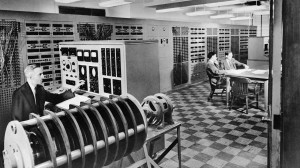Nicholas Negroponte has been predicting—and creating—the future for decades. In this TED talk he walks us through those decades, pointing out what the future looked like from many vantage points in the past, and ending with a startling prediction. Given his track record for correctly predicting the future, do you think he’s right on this one?
[ted id=2043 lang=en]
ted.com/talks/nicholas_negroponte_a_30_year_history_of_the_future
Category: 1.6 History of the Future
 In Digital Planet we tell the stories of many of the pioneers of the digital age—people who invented or discovered ways of doing things that weren’t previously possible. In his book The Innovators, Walter Isaacson weaves many of those stories, and others, together into a larger story—the story of the creation of the Internet. In this Fresh Air interview, he makes it clear that great changes often result from the work of many people over time.
In Digital Planet we tell the stories of many of the pioneers of the digital age—people who invented or discovered ways of doing things that weren’t previously possible. In his book The Innovators, Walter Isaacson weaves many of those stories, and others, together into a larger story—the story of the creation of the Internet. In this Fresh Air interview, he makes it clear that great changes often result from the work of many people over time.
npr.org/blogs/alltechconsidered/2014/10/06/353269811/how-the-cold-war-and-george-orwell-helped-make-the-internet-what-it-is
 In 1984 Apple rocked the advertising world with a Superbowl commercial directed by Ridley Scott. The commercial depicted a futuristic dystopian dictatorship being challenged by a courageous young heroine with a vision; a not-at-all-subtle metaphor for the soon-to-be-introduced Macintosh computer. The commercial won countless awards when it was aired, and many of the revolutionary features of the Macintosh were quickly adopted by Microsoft, the company that the commercial suggested was the enemy of freedom. Three decades later, Apple is no longer a feisty young rebel.
In 1984 Apple rocked the advertising world with a Superbowl commercial directed by Ridley Scott. The commercial depicted a futuristic dystopian dictatorship being challenged by a courageous young heroine with a vision; a not-at-all-subtle metaphor for the soon-to-be-introduced Macintosh computer. The commercial won countless awards when it was aired, and many of the revolutionary features of the Macintosh were quickly adopted by Microsoft, the company that the commercial suggested was the enemy of freedom. Three decades later, Apple is no longer a feisty young rebel.
This new Apple commercial, filmed completely with iPhones, captures a much more optimistic vision of the role of digital technology in our future. (Ironically, it had a lot in common with Microsoft’s Super Bowl ad.) What will Apple’s (or Microsoft’s) visionary commercials look like 30 years from now?
Read more about the ad at huffingtonpost.com/2014/02/03/apple-mac-ad-30th-anniversary_n_4718255.html.
It’s easy to be overwhelmed by bad news and lose hope for the future. In this fascinating and inspiring TED talk, Peter Diamandis makes a compelling case for a bright future fueled by technology, do-it-yourself ingenuity, and a global network of people working together to bring about profound change. Is he right?
http://www.ted.com/talks/lang/en/peter_diamandis_abundance_is_our_future.html
Not long ago “computer literacy” meant being able to use office applications on PCs. For a growing number of people around the world, smart phones and tablets are far more important than desktop—or even laptop—PCs. This article from The Economist illustrates the growing importance of mobile gadgets using clear prose and several illuminating graphs.
http://www.economist.com/node/21531109